Startup Books—for Purpose Driven Entrepreneurs Learn Quickly and Cheaply—from Books
Startup Books can be a boon for business founders. Startup books can be inspirational, informational and/or huge time savers. Chances are high that you are deeply into your product that is going to save the world and make you a fortune. So often a founder is something of a loner, and can be helped by an outside view of the world. Equally there are many ‘how to’ books and they can save you reinventing the wheel. You may not find exactly what you are looking for here, but at least the books listed will help you to decide exactly what is needed.
Purpose Driven Entrepreneurs Learn Quickly—from Startup Books: New Venture Creation has more experts than most fields of activity—because, for every seemingly sure-fire piece of advice, the opposite may well prove to be true. There are no entrepreneurial axioms. Many successful founders share experience through books. Invest in startup books!
The inspiration, advice and practical help in books comes at a very affordable price and short-cut your path to learning. The books described here are a personal selection. All, have meaning and relevance to anyone determined to startup with purpose.
Choose Your Startup Bookstore

Use the Best Bookseller, this one is in San José, Costa Rica
First, choose your bookstore for your startup books. You may already have a favorite. If not consider the relative merits of Bricks and Mortar stores or Online stores.
Bricks and Mortar Stores: If you’re lucky enough to have an independent bookseller in your own community, that’s great. If not, then there is a great online service that uses independent stores. Called IndieBound, it’s is an initiative of the American Booksellers Association dedicated to making the world better one independent bookstore at a time. Locally owned, independent businesses pump money back into their communities by way of taxes, payrolls, and purchases. That means more money for sound schools, green parks, strong fire departments, and smooth roads, all in your neighborhood. When you visit the IndeieBound website, you enter your zip code in the “Buy at Local Store” box to find an independent bookstore near you and a link to purchase through its website.
Online Stores: Of course, you are familiar with Amazon, but what you may not know is that Amazon has a subsidiary called Abe Books, who specialize in secondhand books and with the same service as the parent company. So you can get both hardbacks and paperbacks at much lower cost than new copies.
An online bookstore that I use is an inspirational company itself. Better World Books (BWB) was born in 2003, when a group of recent college graduates sold their used textbooks online. BWB is a purpose-driven company and one of the 82 Founder B Corporations. For every book it sells, it donates one as well. They sell both new and used books, at very competitive prices and delivered free in the US. BWB has donated almost 27 million books worldwide, has raised close to $29 million for libraries and literacy, and has saved more than 326 million books from landfills.
Recommended Startup Books
The startup books below are all titles that I have found valuable as a purpose driven business founder and entrepreneurship teacher. I intend to make additions or deletions as I come across new books, or I feel that a title’s relevance has dwindled. The books appear under very broad categories to help you search. It’s not just a list of titles. I give you a brief intro and my own views where I think they may help.
Here are the subject areas of the startup books:
- Change the World for the Better
- Start a Purpose Driven Venture
- Strategy & Planning
- Manage Money
- Marketing and Sales
- Founders’ Stories
Change the World for the Better
Doing good and doing well is harder than just selling a new kind of mousetrap, or opening a restaurant simply because you like cooking, even though both are hard enough. The mission to change the world for the better takes not only skill, but also take passion and compassion!
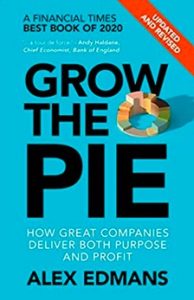 Grow the Pie: How Great Companies Deliver Both Purpose and Profit—by Alex Edmans
Grow the Pie: How Great Companies Deliver Both Purpose and Profit—by Alex Edmans
This is a book for every intending entrepreneur who looks for a way to both make the world a better place and make a profit; and to help build an economy for the people and the planet. Yet Alex aims his words mostly at the big corporate world and public policy makers. We, who start from scratch, have the opportunity to do things differently from the get-go—and a burgeoning number of us are doing just that from a deep moral conviction that both Government and Business have failed the majority.
Alex is Professor of Finance at London Business School and has much experience on both sides of the Atlantic, having done his PhD in Financial Economics at MIT Sloan. Before his undergraduate degree at Oxford, he had attended my Dad’s old School, St Paul’s in London. Not surprisingly his book is deeply rooted in research, both his own and that of many other academic researchers.
Grow the Pie is a very significant book just because of that. At the same time, it comes from Alex’s deep commitment to responsible business, as evidenced by his role as a steering committee member of The Purposeful Company, a consortium that is designing policy changes to encourage companies to pursue long-run purpose rather than short-run profit.
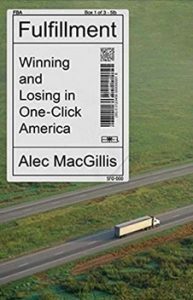 Fulfillment: Winning and Losing in One-Click America—by Alec MacGillis
Fulfillment: Winning and Losing in One-Click America—by Alec MacGillis
Here’s depressing book! It’s about disparity, unfairness and socio-economic inequality. But wait, before you move on to something else more inspiring, know that this is an excellent description of the failure of the fittest to survive, trickle down finance and laissez-faire economics.
Through individual personal stories, MacGillis shows us in graphic ways just why we have to change our approach to doing business. Not only is it immoral, it is unfair, and leads us downhill towards either anarchy or totalitarianism. Ostensibly the book’s central thread is about Amazon’s philosophy and practice and how the web has cast a shadow over how things work in present day America.
However on the other hand, it ably demonstrates important messages about how entrepreneurs and policy makers can lead the way to get out of the mess we have collectively and freely created. No one person is responsible, even though the author implicitly points a finger directly at Jeff Bezos.
Fulfillment shows just why the “1%” should be taxed at pro rata rates similar to ordinary mortals. This is especially true, when you know that nearly 10% of Americans have incomes below $15,000 a year while more than 8% have incomes above $200,000 a year (Statista). It can hardly come as surprise therefore that according to the US Census, 34 million Americans live below the poverty line. Once you have read the book, you will want to change your approach to management in business and government. Entrepreneurs will create new ventures more humanely than ever in the past.
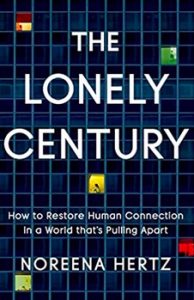 The Lonely Century: How to Restore Human Connection in a World That’s Pulling Apart—by Noreena Hertz
The Lonely Century: How to Restore Human Connection in a World That’s Pulling Apart—by Noreena Hertz
Why on earth should this 2021 book be read by an entrepreneur? It should be read by entrepreneurs and many others in business because, as Noreena reminds us, that even before a global pandemic introduced us to terms like social distancing, loneliness was well on its way to becoming the defining condition of the 21st century.
We use the word community a lot, but we hardly ever stop to consider that the word refers to people with common interests. It’s my opinion that a community can be for reasons like:
Interest: share the same interest/passion; Action: trying to bring about change; Place: together by geographic location; Practice: same profession or activity; Circumstance: together through externalities; Communication: need to share information; Experience: similar employer, upbringing; Virtual: distance interaction; Impact: behavior—cause or consequence; Transaction: buyers and sellers.
The issue is that we can argue endlessly whether we belong to a community or not, and because we can be members of several communities at the same time. Sometimes we can think we belong to a certain community, but feel excluded.
The self-seeking form of capitalism of the last 40 years, the author emphasizes, has marginalized and isolated very large numbers of people who live and work in the community we call the United States. The pushing of the ‘trickle-down’ economy and huge disparities of wealth have tended to cause the dissipation of care and compassion in our community. We should concern ourselves with well-being, not wealth.
She also underlines the obvious alienation and loneliness that results from the pervasiveness of information technology in our lives, as well as downstream negative effects of the phenomena, like the one that online has on Main Street. As Noreena notes, all is not bleak, but the pretension that business should be concerned for all stakeholders, rather than just the shareholders, expressed by the Business Roundtable, is regrettably not very evident in reality yet. The author tells us about Umuganda in Rwanda, a still isolating community (post genocide). The Rwandan word translates as, “coming together in common purpose to achieve an outcome” and was introduced by the government as part of the healing process.called for.”
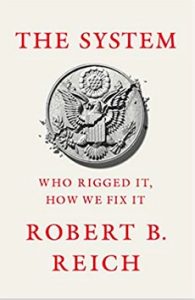 The System: Who Rigged It, How We Fix It—by Robert Reich
The System: Who Rigged It, How We Fix It—by Robert Reich
This title of this book makes it sound like a polemic. It is a polemic, but with answers. Our capitalist system is in a mess and we fight over details, rather than looking more carefully into fixing the whole system. Robert Reich shows how we can make things better for everyone.
When I was growing up we heard the word oligarchs1 a lot. It was always associated with powerful men on the other side of the Iron Curtain Then it came into use once the Curtain came down . Now we don’t have to do that, because they are right here in the United States, dominating the way we run things. There is an urgency to fix the system, but as entrepreneurs we can do our bit, and rather effectively.
Berkeley professor and former Secretary of State, Reich is considered a progressive. There are people on the right who dub him either socialist (as a term of derision) or a communist (which indicates they don’t understand). However, those labels are unhelpful in appreciating the threat to democracy from the few who make up the American oligarchy.
This risk is high and particularly threatens small and medium-sized businesses. Major corporate leaders are largely in cahoots with the law making system, ensuring that they are enabled to both enrich themselves (at the expense of others) and ‘falsely’ inflating the values of quoted share prices, that are supposed to reflect the value of their enterprises.
The book implicitly compares values (basic and fundamental beliefs that guide or motivate attitudes or actions) and value (the monetary, material, or assessed worth of an asset, good, or service). It’s a book on ethics. Professor Reich shows why we need to change the system so that workers and communities have a larger voice in corporate decision making for collective benefit2.
The importance of this book for startups is that they should consider registering as a Benefit Corporation from their inception, since that will require the entrepreneurs to consider carefully the intent of the new venture’s business. Reading this short book, will give them the inspiration to take that route. Reich’s book should inform the thinking and decision making of every entrepreneur, to avoid greed and delusion about how the new venture is going to flourish in a fair community.
1One of a small group of powerful people who control a country or an industry; the term derives from the Ancient Greek oligarkhia meaning “the rule of the few”.
2The German system of supervisory boards was introduced in 1951, reflecting the popular determination that these powerful industries should be brought under greater democratic control and should not be able to be misused, as they had been during the Nazi period.
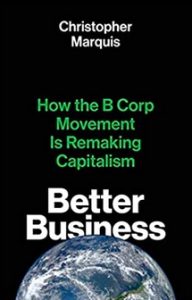 Better Business: How the B Corp Movement Is Remaking Capitalism—by Christopher Marquis
Better Business: How the B Corp Movement Is Remaking Capitalism—by Christopher Marquis
Entrepreneurs and company board members who have any sensitivity towards other people in the world we share, should read this book, by Christopher Marquis. Our interdependence is obvious in daily life. We can no longer expect others to correct or pay for our selfish and shortsighted corporate behavior inside or outside the business.
Chris writes eloquently about the BCorp Movement and stakeholder democracy—the most important business issue of NOW. He shows why it is important for business to move away from shareholder primacy in business, both in our employment practices and commercial behavior. He makes clear why we need legislative and structural change.
Marquis demonstrates how it is not about introducing social good into business the way that palliative corporate social responsibility (CSR) has been practiced. CSR has largely been used by large companies to look good. He shows how remaking capitalism is about a fundamental shift in business priorities from so-called fiduciary responsibility to one that reflects internal and external behavior that demonstrates compassion.
The author is not only a business school professor, but is also an excellent writer who tells a vital story though many examples of businesses learning how stakeholder capitalism is both critical to the bottom line and the survival of business itself. His interviews with business people make the book easy to read and deeply convincing.
This is a startup book that gives us real insight into how the B Lab founders have relentlessly built the B Corporation process through patient persuasion and careful negotiation with lawmakers to introduce the Benefit Corporation institutionally. Venture Founders LLC was a founder BCorp back in 2007. Back then, I had no idea that the BCorp Movement would develop internationally on the scale that it has. I should not have been surprised, given that the original concept was not only designed to be “best in the world, but best for the world”. In essence, Chris lays out how business must change for democracy itself to survive.
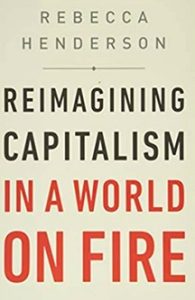 Reimagining Capitalism in a World on Fire—by Rebecca Henderson
Reimagining Capitalism in a World on Fire—by Rebecca Henderson
Rebecca is not alone in showing concern for three great problems of our time: environmental degradation, economic and social inequality, and institutional collapse, but she is one who describes many urgent and practical ways for business to take action.
The book is a delightful and encouraging panorama that inspires and enables businesses of all sizes to take steps to change society for the better in ways that government could, but doesn’t. She cites many examples of companies that have already developed and implemented policies that give us hope that our grandchildren (in my case my great grandchildren) will inhabit a more sustainable and fairer world that reflects our interdependence.
Reimagining Capitalism is a vital read for anyone contemplating a startup, not least for the performance advantages of an all-stakeholder focused business, but the contribution it makes to the survival of our species. Back in 1982, my first startup in the UK was based on the principles Rebecca describes. I was skeptical that my partner’s suggestion of giving away 10% of pretax profits (we became profitable in year 3) would be a good idea. But the resulting benefits repaid us ten times over.
Do not think that stakeholder capitalism is either flaky or a breeze. It requires outstanding vision, articulation and measurement. But the book’s sub-title says it all, suggesting that the need to reimagine capitalism is because the world is on fire. Inaction spells doom. That is why I implore startup to define their purpose and measure outcomes—both for their benefit and ours. A first step is to read Rebecca’s book now.
(Note: Harvard Professor, Rebecca is a Brit by birth (as am I) and she teaches the Reimagining Capitalism course at HBS.)
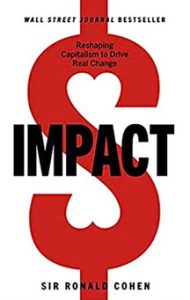 Impact: Reshaping Capitalism to Drive Real Change—by Sir Ronald Cohen
Impact: Reshaping Capitalism to Drive Real Change—by Sir Ronald Cohen
Impact capitalism is what this inspiring book is about. “All over the world, capitalism and democracy are being forcefully challenged. It is becoming increasingly clear that current levels of inequality are unsustainable and people around the world, in both developed and emerging countries, are rebelling against the unfair distribution of social, economic and environmental outcomes,” says the author, when talking about the ‘invisible heart of impact capitalism’.
The notion of impact capitalism derives from the term ‘impact investing‘. “Impacting investing aims to generate specific beneficial social or environmental effects in addition to financial gains. Impact investments may take the form of numerous asset classes and may result in many specific outcomes. The point of impact investing is to use money and investment capital for positive social results (Investopedia)”.
Educated at Oxford and Harvard. Sir Ronald Cohen founded Apax Partners in 1971, when he was 26 and it’s now a huge global private equity firm. Apax has always had a commitment to the impact of their investments as well as growth/profits. They look to the UN Sustainable Development Goals to assess how they can contribute. Sir Ronald has spent many years working in the field of Social Impact Bonds (Pay for Success in the US) in the UK, US and across the world, that ensure that the impact of such investments is quantified. He is devoted to the practice of looking at impact investments through the lens of risk—return—impact, rather than just doling out money to social development and hoping for the best.The author is dedicated to solving bigger problems in the world faster—through business, NGOs, and Government itself, often in partnership.
The book reinforces the need for and role of impact entrepreneurship—and the fact that , as Sir Ronald says, “We can harness these two horses, doing good and doing well.”
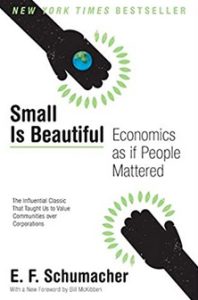 Small is Beautiful: a Study of Economics as If People Mattered—by E F Schumacher
Small is Beautiful: a Study of Economics as If People Mattered—by E F Schumacher
This is a book and set of ideas that I first read, in 1974, the year after it was published (and I had met the author, when he was Chief Economic Adviser to the National Coal Board, now defunct). It has traveled with me on my entrepreneurial journey over 50 years and more.
The title of the book has entered into the vernacular of a growing number of startup books. Schumacher was an internationally influential thinker, who saw the world from a systems perspective, so it’s hardly surprising.
Right up front, even back then, he says, “Modern man does not experience himself as a part of nature but as an outside force destined to dominate and conquer it.” We persist in beating it to a pulp almost 50 years later. The last few words of the book about the “traditional wisdom of mankind” encapsulates his argument in favor of small enterprise and ‘right livelihood’.
As Thich Nhat Hanh says, “The way you support yourself can be an expression of your deepest self, or it can be a source of suffering for you and others.”
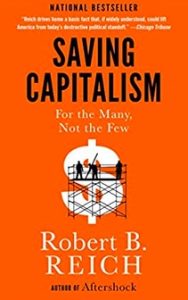 Saving Capitalism: For the Many, Not the Few—by Robert Reich
Saving Capitalism: For the Many, Not the Few—by Robert Reich
In 2015, Robert Reich finishes the book by suggesting that we have the power to alter the rules of the market to meet our needs, rather than continuing to allow a system in which almost all of the gains go to the few at the top.
We need to work together through understanding what’s happening and organizing the market so that the gains are fairly distributed to all.
Just think of the billions of dollars multinationals distribute to shareholders after corporate tax cuts and then ask for government handouts after a market crash, while employees benefited not a jot.
Like other titles in this list of startup books, founders can learn a lot about what not to do, from the behavior of CEOs of the big companies. It underlines their public responsibilities. As Reich says, “the coming challenge is not to technology or to economics. It is a challenge to democracy.”
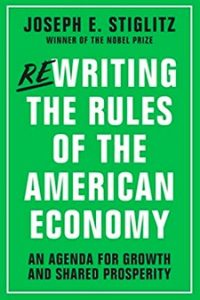 Rewriting the Rules of the American Economy: An Agenda for Growth and Shared Prosperity—by Joseph Stiglitz
Rewriting the Rules of the American Economy: An Agenda for Growth and Shared Prosperity—by Joseph Stiglitz
Nobel prizewinner Joseph Stiglitz cites research that demonstrates that equality and economic performance are complementary, rather than opposing forces and suggests that we can choose to fix the rules structuring our system.
He also makes the point about the economic partners, government, business and labor. Innovative entrepreneurs need to play their part to ensure that in future we share prosperity, and prevent it only flowing to the 1%.
When he talks about ‘growing the middle’ he proposes four major approaches to widespread growth: bring us to full employment; reform the labor market so that everyone benefits; reduce the obstacles to working families; provide genuine economic security and opportunity for all Americans.
 Buddhist Economics: An Enlightened Approach to the Dismal Science—by Clair Brown
Buddhist Economics: An Enlightened Approach to the Dismal Science—by Clair Brown
First, do not be put off, if you are neither Buddhist nor meditator, this book is really important for all three of the economic partners: government, business and labor. A Berkeley professor of economics, who happens to be a Buddhist, Clair writes very directly from her own experience as well as her professional experience.
She acknowledges that the term Buddhist Economics was coined by Fritz Schumacher (see Small is Beautiful above), but in my view, she makes the subject both real and applicable.
Brown contends that Buddhist Economics can “provide guidance for restructuring both our individual lives and the economy to provide a better world. She advocates an approach to organizing the economy so that a meaningful life reflects our caring for one another and a global sharing of the world’s resources in a sustainable system.
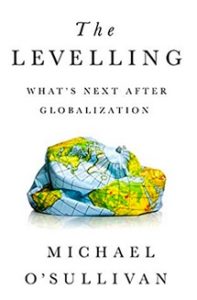 The Leveling: What’s Next After Globalization—by Michael O’Sullivan
The Leveling: What’s Next After Globalization—by Michael O’Sullivan
This an inspirational book for founders who want to anticipate how the business environment is going to change. Several of the titles in this list of books for startups will greatly help founders to anticipate issues that in future may risk their own venture’s existence.
This one will give you context for how for the US and its place in the world undergoes radical change—the ebbing of influence, profound questions over its economic model, societal decay, and the turmoil of public life. He suggests world is becoming multipolar, as the arrogance of leaders impels the process of leveling.
Writing in 2019, O’Sullivan suggested that the world was turning away from globalization and that the multipolar order is fraught with risks, not least: debt, low productivity, and the rise of trade and military tensions. Sounds like today.
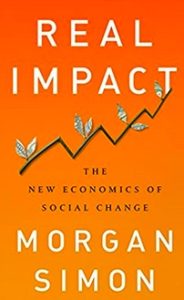 Real Impact: the Economics of Social Change—by Morgan Simon
Real Impact: the Economics of Social Change—by Morgan Simon
A leading investment professional explains the world of impact investing–investing in businesses and projects with a social and financial return—and shows what it takes to make sustainable, transformative change.
Morgan Simon is co-founder of the Candide Group, that directs capital away from an extractive global economy towards investments dedicated to social justice and sustainability.
Simon closes the book by saying, “we have the opportunity, working together, to create structures that will rebuild an economy to serve real people and a healthier planet.” He calls for a broad and inclusive community and transformative change. He is under no illusions and says, “the journey will be messy, heartbreaking, intense and beautiful.” His view sounds like a life with which every entrepreneur is very familiar.
Start a Purpose Driven Venture
This startup books category aims to give both more power to your elbow and provide very practical guidance on how to implement your firm intention to make your nascent venture a prosperous contributor to the world that has enabled you to start a business at all.
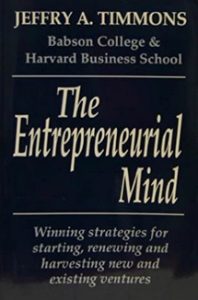 The Entrepreneurial Mind: Winning Strategies for Starting, Renewing and Harvesting New and Existing Ventures—by Jeffry Timmons
The Entrepreneurial Mind: Winning Strategies for Starting, Renewing and Harvesting New and Existing Ventures—by Jeffry Timmons
I first met Jeffry in 1981 when he was a mentor on a series of venture capital workshops run by Venture Founders Corp, the Boston vc company of which he was one of the founders. I named my own business Venture Founders, many years later and long after they ceased trading—in his homage. He answers the question, “What are the attributes, attitudes, philosophies and strategies of successful entrepreneurs.”
Among all these startup books, this is one on the least known these days and most inspiring nonetheless. Jeffry said that “entrepreneurs possess both a creative and innovative flair and solid management skills and business know–how.” I always felt that when I was in groups with him. It also does not surprise me that most successful entrepreneurs create their first enterprise in their mid-forties.
One of Jeffry’s messages is that successful entrepreneurs have identified enough reachable customers for their service or product—before they start the business. That was a very strong message for me and my first business started with the company with three signed customers, the most important for me was Mars Confectionery, a ‘reference’ client.
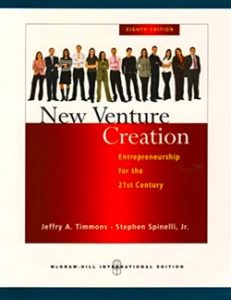 New Venture Creation: Entrepreneurship for the 21st Century—by the same Jeffry Timmons
New Venture Creation: Entrepreneurship for the 21st Century—by the same Jeffry Timmons
Among startup books, this is more of a manual, compared with the enlightening book I suggest above. BUT, it should be a must-have on any founder’s bookshelf. It runs to nearly 800 pages in large format, so you won’t refer to it daily, but having it there to search is a powerful and time-saving answer to many ‘how do I?’ and ‘what should I?’ questions across all business functions, as well as the philosophy behind the actions. My copy is falling apart!
The book covers all the bases, so far as I am concerned—both the practical, like the business plan and the emotional/ethical aspects of what it takes to start a new venture and lead it to flourish, and even face the potential downfall of what Jeffry calls the ‘troubled company’. This book is a must for your entrepreneurial shelf. Please buy yourself a copy and keep it close at hand. It is as relevant today as when it was first published in 1977.
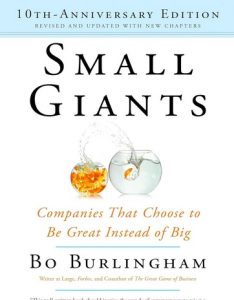 Small Giants: Companies That Choose to Be Great Instead of Big—by Bo Burlingham
Small Giants: Companies That Choose to Be Great Instead of Big—by Bo Burlingham
Bo’s book, Small Giants is a book that should be on the desk of anyone contemplating starting a purpose driven venture. He has amazing clarity about what matters both for the entrepreneur and the world’s economic system. The original was published in 2005, but this new edition (2016) celebrates its tenth anniversary and it includes both revisions, updates and a new chapter.
Bo is clear about what great startups must do right from the start, and as they develop into thriving businesses. They need clarity about their reason for being, their soul and why it must not only be implicit in everything they do, but explicit, so that even when they veer from their purpose, their honesty and sense of responsibility is clear. Their ‘mojo’ needs to be fixed in their bloodstream. Mojo being that quality that “attracts people to you and makes you successful and full of energy”, as the Cambridge Dictionary says.
The way that the business is in the world should make plain the role it plays in the community, not least through intimate relationship with customers and addressing the needs of employees as human beings. What is wonderful about this book is that while Bo puts so much of himself into the stories, they are based on carefully chosen real life cases.
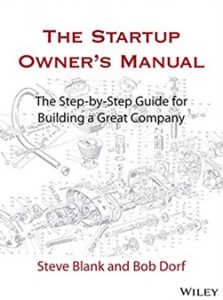 The Startup Owner’s Manual: The Step-by-Step Guide for Building a Great Company—by Steve Blank and Bob Dorf
The Startup Owner’s Manual: The Step-by-Step Guide for Building a Great Company—by Steve Blank and Bob Dorf
The most significant difference between this book and New Venture Creation is that all the 500 or so pages the Manual are devoted to customer development—soup to nuts. As the authors advise, this is not a book to read cover to cover. This is one of the most practical startup books there is.
Get familiar with the way it’s organized, so that you can consult the right sections of it as you get the venture off the ground and go through the early stages of development. I wish I had had the book in 1982 for my first startup.The authors talk very directly to founding entrepreneurs.
As they say, it’s the “bright and burning founder’s vision that differentiates an entrepreneur from a big company CEO and separates startups from existing businesses.” They add, “To succeed, they must abandon the status quo, recruit a team that shares their vision, and strike out together on what appears to be a new path, often shrouded in uncertainty, fear and doubt.”
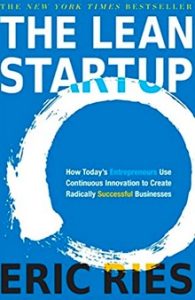 The Lean Startup: How Constant Innovation Creates Radically Successful Businesses—by Eric Reis
The Lean Startup: How Constant Innovation Creates Radically Successful Businesses—by Eric Reis
Startup books have produced many words that have passed into the business vocabulary. This one has spawned a whole new world for entrepreneurs (and many other books that use the thinking and apply it to particular situations). The Lean Startup’s central idea is to bootstrap the startup financially. The central idea is about learning from failing fast and often. In other words, not ‘betting the farm’. Too often I have met entrepreneurs who want to get from idea to perfect prototype before they start up. These people are those who probably never actual get to Day One of a new venture.
As a basis for Lean Startup, Eric defines a startup as a human institution designed to create a new product or service under conditions of extreme uncertainty. The lean startup concept has become so ubiquitous that many entrepreneurs don’t even know its origin.
If you research ‘lean startup’, you will find many derivative books and other information that you’ll surely find helpful. There’s even a Lean Startup Institute set up in Boston by James Womack in 1967.
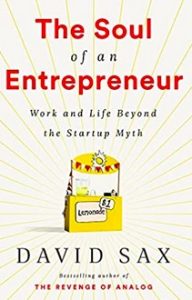 The Soul of an Entrepreneur: Work and Life Beyond the Startup Myth—by David Sax
The Soul of an Entrepreneur: Work and Life Beyond the Startup Myth—by David Sax
“Starting your own business isn’t about becoming an instant billionaire. It’s about choosing the work and life you want for yourself every day,” that’s what David Sax’s book is all about. He tells it how it is for us ordinary mortal, not the fables of Silicon Valley. It’s about the fabric of our society. You might think that you don’t have time for startup books of this reflective nature, but you’d be wrong.
This book is reassuring to all those who say to themselves, ‘Oh, I couldn’t really put my ideas into practice!’ But, oh yes, you can! Have been there, done that I can assure you can. Like David Sax, I want to sell you on the idea than you can start a new venture and if you are not convinced, then you must read this book.
The business press loves to write about the glamorous, sexy, icons of the financial world, but for most of us that’s fantasy. However, don’t be daunted. We can really make a difference in the world, one customer at a time, even if nobody ever writes a word about us. This is not Hollywood, Wall Street, it’s main street, home town.What’s exciting about today is that entrepreneurship has been democratized.
We can indeed start businesses on our kitchen table, our sewing machine, our laptop. The motivation to become an entrepreneur is not universal. There are endless reasons to take the leap, My own experience was the most mundane. I had tried and failed before, but i had just reached the point where I had to do it. I did not want to, nor did I need to put my three kid family or my mortgage at risk. That did not mean I was headed on a foolhardy mission.
David Sax is a Canadian entrepreneur (of a kind). He is a freelance writer motivated to explore why and how the world works the way it does. As he says, “In order to be an entrepreneur, a person needs to fully own their work and have complete independence over its direction.” That’s what’s so exciting.. He quotes Wendy Guillies, who runs the Marion Ewing Kauffman Foundation that promotes entrepreneurship. She says, “I’m glad entrepreneurship is cool, but I think it needs to be something everyday people can see themselves at.”
I found Sax’s book very exciting and reassuring at the same time. I am done with my entrepreneurial career at the practical level, but I can exhibit entrepreneurial traits at the age of 82. How about: passion, optimism, discipline, proactivity, learning, competitive, humble and kind… You know you can do it, right here, now!
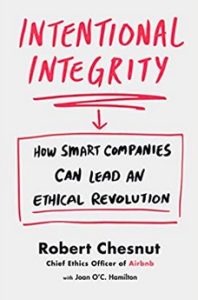 Intentional Integrity: How Smart Companies Can Lead an Ethical Revolution—by Robert Chesnut
Intentional Integrity: How Smart Companies Can Lead an Ethical Revolution—by Robert Chesnut
Integrity is illusive. Yours may differ from mine. So it is with startups or big companies. If we don’t define what integrity means to your business, everybody in it may have a different idea of what it represents.
Definition is only the start. We need to make sure we are all on the same page, so our definition needs to be codified and worked through every part of the business, written down, critiqued, discussed, shared and reviewed. Participative training sessions will be involved.
In addition, we’ll need to establish ways to monitor our behavior against the definitions and report on performance. Robert Chesnut, the author of Intentional Integrity, is a lawyer and the chief ethics officer of airbnb. He has plenty of stories to tell, both from his own experience and that of others. He goes into many illustrative examples based on real cases.
He describes what are Code Moments and has 40 pages of discussion on them. They mostly refer to larger companies. However the entrepreneur would do well to be aware of the kinds of ‘moments’ that can happen very quickly, while attention is focused on surviving and growing the startup. As Reid Hoffman, co-founder of LinkedIn, has commented “His book contains smart, practical advice for anyone looking to do good and do well.”
In my 1982 startup it took us about four years to codify what we stood for: “People and Profits; We Are Our First Customers; Benefits Not Badmouth; Market Driven With Values; Everyone Carries Boxes; Everyone Sells; Fun Matters Too; Responsible in the Community; Success to Empower Others; Profits and People.” It was hard work to maintain and we did have a few lapses.Robert’s book would have been invaluable to us had we had it back then.
Start with Why: How Great Leaders Inspire Everyone to Take Action—by Simon Sinek 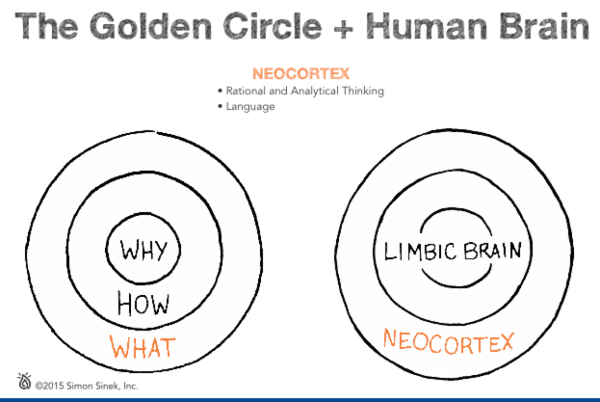
This is a book that everyone who has entrepreneurial ambitions would do to read, before they get too deep into the planning and execution of their venture. Simon describes how the power of Why completely changed his view of the world and restored his passion to a degree multiple times greater than at any other time in his life.
He describes what he calls the Golden Circle, which inverts the order of how most startups, and businesses in general, are designed and promoted. Rather than starting with what the startup is (features) and telling how it works (benefits), he would recommend you start with why (purpose) the venture exists. he points out that business people focus on the what first, using their neocortex (rational) brain, not their limbic (emotional) brain. Think about it…
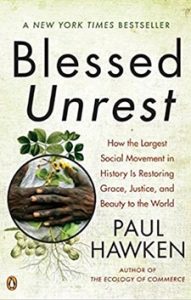 Blessed Unrest: How the Largest Movement in the World Came into Being and Why No One Saw It Coming—by Paul Hawken
Blessed Unrest: How the Largest Movement in the World Came into Being and Why No One Saw It Coming—by Paul Hawken
Paul is both entrepreneur and environmentalist. He has influenced many people, in both spheres. Almost a third of the book is a list of activist organizations purposefully concerned with building a globe that is systemically fair, compassionate and sustainable.
Paul was an entrepreneur first having founded Erewhon, the first natural foods distributor in the US, then Smith & Hawken a garden products catalogue and distributor company. Startup books written by entrepreneurs, like this one, are inspiring.
Growing a Business—by Paul Hawken
Though you might think a book written in 1988 has no relevance to today’s startups, you’d be wrong. His first entrepreneurial venture, well before that, was a natural foods business he started in Boston in 1968. So don’t think that natural foods retailing is a new phenomenon. Whole Foods (then called Safer Way) was founded in Austin, Texas ten years later.
The book flows from his startup experience in more than one venture. It is very personal and does not resemble a ‘how to’ manual, but rather is an inspirational read. I would judge that Paul was the first entrepreneur of the twentieth century to marry profit with purpose. Now the purpose-driven business has come a long way, but the strong vision and honesty of this book will charge the resolve of new venture creators and lead them to avoid falling into the growing abyss that herds of shareholder capitalists are tumbling into.
Read this book to give power to your elbow. Apart from anything else, he tells you why too much money is a more dangerous problem to have, than having not enough. “People intuitively understand that a good business enhances the lives of those who work within it, and enriches the lives of all those who touched by it”, Paul made this statement over thirty years ago. Mmm!
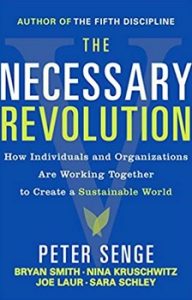 The Necessary Revolution: Working Together to Create a Sustainable World—by Peter Senge, Bryan Smith, Nina Kruschwitz, Joe Laur and Sara Schley
The Necessary Revolution: Working Together to Create a Sustainable World—by Peter Senge, Bryan Smith, Nina Kruschwitz, Joe Laur and Sara Schley
Peter and coauthors describe how today’s most innovative leaders recognize that we must implement revolutionary—not just incremental—changes in the way that we live and work. Dare to be great and don’t restrict yourself by so-called conventional business wisdom. Much is largely hooey, and devoted to transactions and money!
“The organizations that will truly excel in the future will be the organizations that discover how to tap people’s commitment and capacity to learn at all levels in an organization.” This remark by Senge should be a mantra for all entrepreneurs, especially as they prepare to launch a new venture and throughout the early stages of the enterprise.
The learning he talks about applies to everyone involved in the startup. It’s not just about training and development. It’s about a way of life and to ensure the survival and flourishing of the young business.
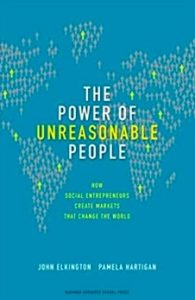 The Power of Unreasonable People: How Social Entrepreneurs Create Markets That Change the World —by John Elkington and Pamela Hartigan
The Power of Unreasonable People: How Social Entrepreneurs Create Markets That Change the World —by John Elkington and Pamela Hartigan
The book is about the creation of real value and real wealth.
John Elkington say that, “by bringing natural, social, human, intellectual, and cultural forms of capitalism into the equation, social entrepreneurs aim to deliver real wealth to billions of people around the world who have so far been excluded from the benefits of the market economy.”
Whether you are building a formal social enterprise or not, John’s concepts are entirely relevant to a purpose driven venture of any kind.
In his 2020 book, John Elkington explains the title, Green Swans, as symbolizing radically better times to come. He describes a green swan as one who delivers exponential progress in the form of economic, social and environmental wealth creation.
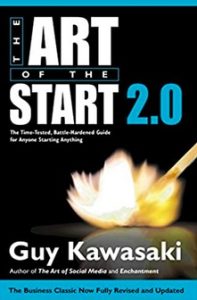 The Art of the Start 2.0: The Time-Tested, Battle-Hardened Guide for Anyone Starting Anything—by Guy Kawasaki
The Art of the Start 2.0: The Time-Tested, Battle-Hardened Guide for Anyone Starting Anything—by Guy Kawasaki
Guy is amazing. He knows that entrepreneurs do it to make the world a better place; and to do something they love. He insists that founders have to make meaning, but takes you through very practical steps of conception, activation, proliferation–and the art of being a mensch: someone who is ethical, graceful, and admirable!
Guy’s irreverent and enthusiastic writing gives your morale a boost as you struggle with turning your idea into reality. I always find him a joy to read and his turn of phrase gives you encouragement as you work on the tough stuff.
At nearly 70, Guy still inspires budding entrepreneurs to go in the right direction with his oft repeated quote, “The best reason to start an organization is to make meaning; to create a product or service to make the world a better place.”
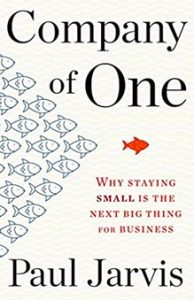 Company of One: Why Staying Small Is the Next Big Thing for Business—by Paul Jarvis
Company of One: Why Staying Small Is the Next Big Thing for Business—by Paul Jarvis
This book is written by someone who quit the corporate world to set up on his own not as a freelance, but by starting a company that he deliberately wanted to stay small—a company of one—to have a richer and more fulfilling life. He managed to stay small on purpose.
By staying small, one can have freedom to pursue more meaningful pleasures in life, and avoid the headaches that result from dealing with employees, long meetings, or worrying about expansion. Company of One introduces this unique business strategy and explains how to make it work for you, including how to generate cash flow on an ongoing basis.
For Paul, staying as a company of one was fine as a freelancer, but he also is the co-founder of Fathom Analytics, where they “don’t chase Venture Capital or need investors— we’re customer-funded, proudly bootstrapped, and they’re the only folks we answer to. We don’t put hyper-growth customer acquisition above retaining and keeping the customers we already have happy. Our most significant sales pipeline is the folks who are already paying us, telling everyone they know to give Fathom a try.”
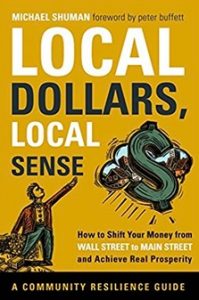 Local Dollars, Local Sense: How to Shift Your Money from Wall Street to Main Street and Achieve Real Prosperity—by Michael Schuman
Local Dollars, Local Sense: How to Shift Your Money from Wall Street to Main Street and Achieve Real Prosperity—by Michael Schuman
This book is in a similar vein to the Company of One. Michael is director of research for Cutting Edge Capital and an economist/lawyer, but more important he has been and advocate for and leader of community-based economic development efforts across the country.
He wrote The Small-Mart Revolution about how small local companies are competing with the giants. This book is about believing in yourself and not to be beguiled by America’s investment system, which is broken—even more now, than when the book was published, eight years ago. On the positive side, there have been many initiatives, including those spurred on by him, that facilitate a revival of local communities. His most recent book is called Put Your Money Where Your Life Is. The title says it all and I think more startup books would take that mantra to heart.
You can sign up for his newsletter by visiting his website—I am a subscriber, being convinced that if we can contribute to our local community in practical ways, then we are also contributing to the wider world community.
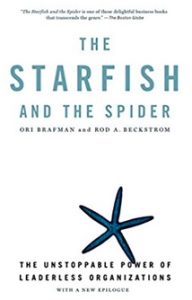 The Starfish and the Spider: the Unstoppable Power of Leaderless Organizations—by Ori Brafman and Rod Beckstrom
The Starfish and the Spider: the Unstoppable Power of Leaderless Organizations—by Ori Brafman and Rod Beckstrom
If you cut off the spider’s head, it dies, but if you cut off a starfish’s leg, it grows a new one. It may even grow into a new starfish altogether. Traditional top—down organizations resemble the spider, and the more agile ones resemble a starfish.
The starfish are more networked and better able to sustain themselves. If knowledge and power is distributed and responsibility is dispersed, you’ll avoid team members saying they can’t do something because “it’s above their pay grade.”
It may sound odd to suggest that good leaders should be catalysts, but it’s a point that many budding entrepreneurs miss. Frequently the founder is so driven that she overlooks how great contributions of others are often what makes the success of the founder. Like many of the startup books I list here, this one will add a new dimension to the new venture’s success.
Strategy and Planning
This section on strategy and planning could help you avoid failure in your entrepreneurial endeavors. When I taught new venture creation on an MBA program, I paired the course with what I called sustainable strategy, for good reason.
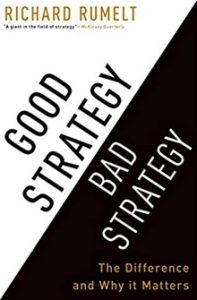 Good Strategy Bad Strategy: The Difference and Why It Matters—by Richard Rumelt
Good Strategy Bad Strategy: The Difference and Why It Matters—by Richard Rumelt
Strategy is a very fluid and complex subject. Rumelt’s three components really help you understand the strategy process: diagnosis that defines or explains the nature of the challenge; guiding policy for dealing with the challenge; coherent actions that are designed to carry out the guiding policy. He calls bad strategy ‘fluff’, or the “superficial restatement of the obvious combined with a generous sprinkling of buzzwords.” Entrepreneurs can easily be seduced into fluff, especially when they follow a ‘template’ kind of way of developing a business plan.
In a 2007 McKinsey interview, Professor Rumelt said, “Most corporate strategic plans have little to do with strategy. They are simply three-year or five-year rolling resource budgets and some sort of market share projection. Calling this strategic planning creates false expectations that the exercise will somehow produce a coherent strategy.”
Rumelt is not specifically writing for entrepreneurs, but I advise all who want to start a business to read his words before they get too far down the track. My MBA students benefited hugely from the book.
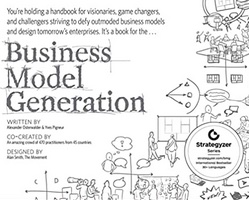 Business Model Generation—by Alexander Osterwalder and Yves Pigneur
Business Model Generation—by Alexander Osterwalder and Yves Pigneur
The authors claim it is a book for visionaries, game changers, and challengers who want to design tomorrow’s enterprises. My own view is that you should not look at it until you are pretty sure about what you want your new business to do. Why? Because you would be tempted to use the visual tools it includes–they are such fun to play with–that you might start off down the wrong track. But once your idea is more than a scribble or dream, buy this book and use it like a fiend with your team or others who can lend a hand. I would rate the book as a must-have on any entrepreneur’s bookshelf, probably both before and after startup. You would benefit by looking at my post on the Business Model Canvas, the core of the book before you buy it.
Value Proposition Design—by Alexander Osterwalder, Yves Pigneur, Patricia Papadakos
Next to Business Model Generation, I would add the sequel–this book. So many people will use the jargon-sounding term, ‘value proposition’, and not really understand the deep meaning of the term. Coming up with a value proposition that matches the startup’s purpose and its offer to the needs of the customer, is absolutely not a simple task. But this book and its Value Proposition Canvas makes the process a huge amount easier. Making use of the Canvas by first designing it, then testing it in real life, before evolving it to a point where it can really make a difference, is a task that you will really only come to understand once you have read and applied this book.
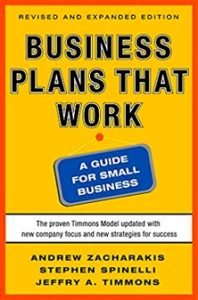 Business Plans That Work: A Guide for Small Business—by Jeffry Timmons, Andrew Zacharakis and Stephen Spinelli
Business Plans That Work: A Guide for Small Business—by Jeffry Timmons, Andrew Zacharakis and Stephen Spinelli
If you want more fundamental help, then the only book to buy is this one. The (late) Jeffry Timmons said, “We are in the midst of a silent revolution–a triumph of the creative and entrepreneurial spirit of humankind throughout the world.”
Using practical examples, the authors take you through a really thought-provoking process that will result in a very effective plan. There is a lot of hot air talked about business plans, but not in this book. Startup books are probably the fastest growing category among business books in general. This is one to have on your office bookshelf.
The authors’ message is clear. “By going through the business planning process, you will improve your chances of success. The process and discipline put you in charge of evaluating and shaping choices and initiating action that makes sense, rather than letting things just happen. Having a longer-term sense of direction is highly motivating. It is also extremely helpful in determining when to say no (which is much harder than saying yes) and can temper impulsive hunches with a more thoughtful strategic purpose.”
I was tempted to put this last paragraph in bold type, because from my own entrepreneurial experience, the message rings very true. On day two of my first business, many of the details of our business plan were outdated, but the thinking carried us through to the third year and profitability.
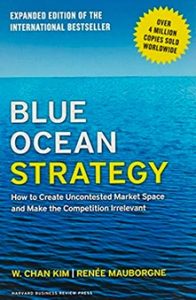 Blue Ocean Strategy: How to Create Uncontested Market Space and Make the Competition Irrelevant
Blue Ocean Strategy: How to Create Uncontested Market Space and Make the Competition Irrelevant
by W Chan Kim and Renée Mauborgne
Still as relevant as ever, the advice in this book may seem to be a tough way to go, but the rewards are exciting. The business I started last century seemed crazy to customers when we first went on the road, but care and attention, took us into nice blue oceans, leaving behind the shark infested red ones. I am not saying we had no competition. We did, but we knew who and where they were.
Writing now, the authors encourage you by saying, “We are more convinced than ever of the need to create blue oceans. With a clear roadmap, the right tools and a good dose of humanity and confidence, anyone, any organization and any business, big or small, can make a blue ocean shift.”
I suggest that you visit their website and especially their Blue Ocean Strategy Tools, which you can apply directly and make a huge difference to your chances of success in your new venture. As an after thought, you may also want to check out my own Tools for Founders. This is one of the most successful startup books ever published.
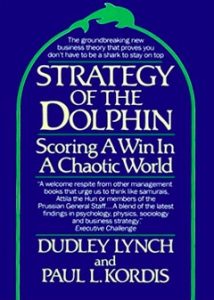 Strategy of the Dolphin: Scoring a Win in a Chaotic World—by Dudley Lynch and Paul L Cordis
Strategy of the Dolphin: Scoring a Win in a Chaotic World—by Dudley Lynch and Paul L Cordis
The book originally appeared in 1988, but has a blood curdling reality still. They say, “Where we find thoughts, feelings, actions, and intuitions that bring together people and resources elegantly, we find circumstances and situations that are attractive to dolphins.”
This book is about why and how we can change our awareness of complexity, as well as the skills and sensitivity we need to work with it. The authors talk about being ‘on purpose’ and ‘pushing the envelope’. You don’t have to be a shark to be a success in business.
This is not a strategy books per se, but one which will really help your approach to strategy. The authors point out that the brains of dolphins are actually larger than our own, and the dolphin’s associational cortex, the part of the brain specialized for abstract and conceptual thinking, is itself larger tan our ours, too.
Manage Money
Though an accountant’s approach to startup can often lead to seeing the new venture as a matter of transactions (rather discounting the relational aspects), managing money is what keeps the show on the road. The titles in this section of Startup Books are a necessary ingredient of any startup’s success.
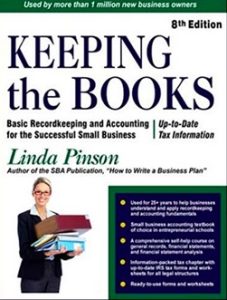 Keeping the Books: Basic Record-keeping and Accounting for Small Business—by Linda Pinson
Keeping the Books: Basic Record-keeping and Accounting for Small Business—by Linda Pinson
Now nearly a quarter of a century since it’s first edition, this is one of the most successful and effective guides to preparing and analyzing financial statements, setting up bookkeeping systems, and planning for taxes. Featuring chapters on income and expenses, cash accounting vs. accrual accounting, numerous small business resources, and a rundown of facts about independent contracting, it has been updated to reflect the latest forms and worksheets.
The guide has helped hundreds of thousands of new entrepreneurs to understand and apply small business record-keeping practices that have contributed significantly to increased profits here in the US. It’s a ‘must have’ among startup books.
No competition to Linda’s book, I also encourage you to take a look at my eBook, Founders Keep Afloat: by tracking 25 vital facts and figures—it’s yours for free.
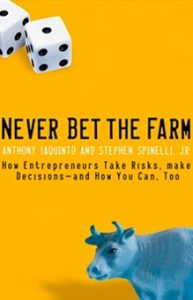 Never Bet the Farm: How Entrepreneurs Take Risks, Make Decisions-And How You Can, Too—by Anthony Iaquinto and Stephen Spinelli
Never Bet the Farm: How Entrepreneurs Take Risks, Make Decisions-And How You Can, Too—by Anthony Iaquinto and Stephen Spinelli
This book may sound boring, but I can tell you it’s not. It’s almost an essential read to prevent the frequent reason for startup failure—running out of cash. The authors’ motto is ‘never spend a dollar, when a dime will do. That does not mean being a cheapskate, but may save you being forcibly evicted from the farm. The authors (despite being business school teachers!) do not go on endlessly or spout theory, they are storytellers, who use examples. This makes the book an easy and compelling read.
Stephen was co-founder of Jiffy Lube apart from anything else. He was appointed President of Babson College in Boston in 2019. He has taught there for the last 15 years and was Director of the Arthur M Blank Center for Entrepreneurship. Babson is the gold standard for entrepreneurial thinking and it’s statement of purpose is to, “Empower learners everywhere to create lasting value for themselves, their communities and the world.”
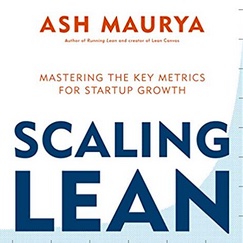 Scaling Lean: Mastering the Key Metrics for Startup Growth—by Ash Maurya
Scaling Lean: Mastering the Key Metrics for Startup Growth—by Ash Maurya
You may or may not be dedicated to growth as you struggle to get your startup off the ground, but on Day Two, you will need to begin to think about survival. Naturally you’ll be giving a huge amount of your attention to marketing and sales. Maybe you won’t be worrying about measurement in your flurry of promotional activity, but on Day Three, you probably should be!
Ash Maurya is the creator of the Lean Canvas, variant of Business Model Canvas and an active mentor in the Lean Startup movement. His fast-paced book gives you many ideas about how you can see if your ‘big idea’ will survive
My personal experience tells me that you may not follow this highly illustrated guide step by step, but it will give many invaluable ways to track how things are going and to prevent you repeatedly committing the same errors, simply because you don’t understand what’s really happening in your baby business. It is not just a matter of revenue, you know!
You will learn from many of the examples he describes—from companies familiar to you. Traction will be what you’re after however grand your ambition are; without momentum you will not survive. If you look, you’ll find many startup books with ‘lean’ in their title.
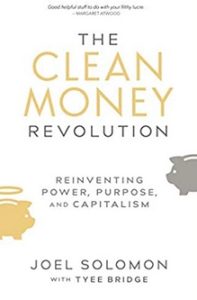 Clean Money Revolution: Reinventing Power, Purpose and Capitalism—by Joel Soloman
Clean Money Revolution: Reinventing Power, Purpose and Capitalism—by Joel Soloman
Joel Solomon is a Founding Partner of Renewal Funds, Canada’s largest mission venture capital firm, at $240m assets under management. Investing in Organics and Environmental & Climate Technology in Canada and the USA.
He has invested in over 100 early-growth stage companies in North America, delivering above-market returns while catalyzing positive social and environmental change. He has used his wealth to change his community. He interviews a selection of investor, nonprofit and business leaders about their experience in the field. He describes clean money as, “money aligned with a purpose beyond self-interest.
Money for the Commons. Money that makes the world better.” My reason for recommending the book is that reading it will give you a sense of what mission-driven venture capitalists look for in relation to entrepreneurs in whom they might invest.
Have a look too, at my incomplete Directory of Mission Driven Capital. There are nearly 100 sources of such finance sources.
Marketing and Sales
When I was first in business in the sixties, Marketing and Sales was bold and brash. Happily, now we take a more reflective approach. This section of startup books has a wide focus, more about the approach than the practice.
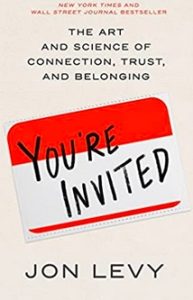 You’re Invited: The Art and Science of Connection, Trust, and Belonging—by Jon Levy
You’re Invited: The Art and Science of Connection, Trust, and Belonging—by Jon Levy
This is not meant to be a marketing book, but it certainly is a book for marketers—an important one. Even more important, for entrepreneurs, Jon Levy’s book will lead them to understand ‘influence’ and how it helps to set the whole tone and behavior of the business from the start. It will help fundamentally the way the new venture goes about business altogether.
The book describes successful ways to build trust with others, both inside and outside the business and it shows how connecting with others works, both well and badly. Above all the book demonstrates the significance of community and the interdependence between all stakeholders in any endeavor.
Jon does not describe the media of influence per se, but rather the ways that we behave, either positively or negatively and the how those behaviors help or hinder the business to share value and thrive.
You’re Invited! If you accept, it will help you to make a positive contribution to the culture of the place you work in and the implications that it has for all those involved or impacted by it.
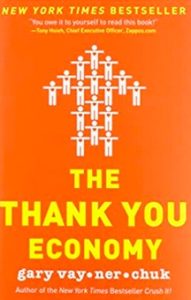 The Thank You Economy—by Gary Vaynerchuk
The Thank You Economy—by Gary Vaynerchuk
Apart from being a bestseller writer, Gary is a serial entrepreneur himself. He says that how you make your money is more important than how much you make.
The Thank You Economy is about something big. It isn’t some abstract concept or wacky business strategy—it’s real, and every one of us is doing business in it every day, whether we choose to recognize it or not.
What interests me is that for so many years companies have been told to construct their ‘vision and values’, ‘mission statements’ and the like and then when you interact with the company, it’s clearly b……t. They do not belong to the people who work there, nor do outsiders experience them.
Gary is very much a self promoter and thrives on it, but his enthusiasm and concern for being human in business is critical if we are to get away from the transactional to the relational way of behavior at work.
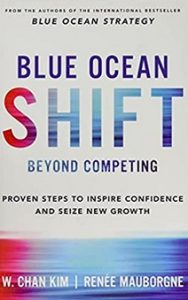 Blue Ocean Shift: Beyond Competing—Proven Steps to Inspire Confidence and Seize New Growth—by W Chan Kim and Renée Mauborgne
Blue Ocean Shift: Beyond Competing—Proven Steps to Inspire Confidence and Seize New Growth—by W Chan Kim and Renée Mauborgne
Yes, the same authors as Blue Ocean Strategy (above), but with much more experience of the Strategy’s application in practice. The authors show you how to move beyond competing, inspire your people’s confidence, and seize new growth, guiding you step-by-step through how to take your organization from a red ocean crowded with competition to a blue ocean of uncontested market space.
What is most encouraging for entrepreneurs taking their first steps is what the authors say about human vulnerability. “When we think about people as people, not as corporate executives, entrepreneurs, or government officials, and certainly not as human resources, we realize that, behind our titles, all of us are incredibly vulnerable. No matter how tough, confident, or polished we may appear, all of us are tender at our core. We strive to avert reproach. We want to avoid making fools of ourselves. We pretend we know more than we do.”
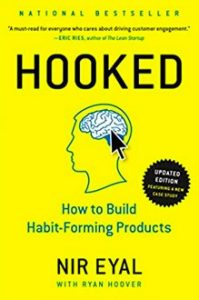 Hooked: How to Build Habit-Forming Products—by Nir Eyal
Hooked: How to Build Habit-Forming Products—by Nir Eyal
The author conceived the Hook Model as a way to remind product developers to get products into the minds of potential users.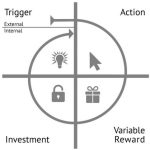
The Trigger is commonly the ‘call to action’, or something about the product that calls us to take a look. The Action comes next when we click on a link as we’re drawn to something by the ease of doing it as well as the psychological motivation. The Variable Reward comes from the brain surge in expectation of reward, that suppresses judgement and reason. The Investment phase increases our chances of passing through the Hook phase again. The payoff of this short book is the last chapter that helps us to know where to look for ‘habit-forming opportunities’.
Founders’ Stories
Startup Books that tell the stories of the entrepreneurial journey can be very revealing to others who are preparing their own new ventures. The personal experiences can sometimes be more illuminating than ‘how-to’ books.
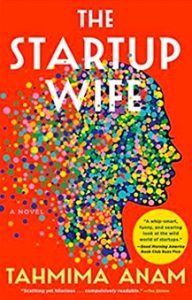 The Startup Wife—by Tahmina Anam
The Startup Wife—by Tahmina Anam
Tahmina, the author of this novel, is a real startup wife, so this fictional story comes from a place of knowing what it’s like. Her husband, Roland Lamb started Roli, a London music tech startup in 2009, now in administration. She was on the Board, so her insights come not just from being married to an entrepreneur, but by being a part of the business herself.
Ironically, Roli went into administration around the time that Tahmina’s novel was published in the Fall of 2021. Though well capitalized, Roli’s burn rate felled the company, with growth being less than projected. Roland and Tahmina remounted their horse and founded Luminary, a new company that has taken over all the IP, staff, products, brands and assets of the failed Roli. Luminary’s mission is to help everyone to experience the joy of music learning and creation.
Luminary, also based in London, raised £1.5 million (Sterling) on the Kickstarter crowdfunding platform as well as attracting angel (Keith Morris), corporate (Sony Music) and venture capital (Hoxton Ventures).
The novel is a fast-paced narrative that pulls you this way and that. It may offer the intending entrepreneur some sage warnings as well as exciting encouragement. I recommend the book to anyone who envisions going down the startup road.
If you are going to start a new venture with your spouse, be warned that it will be a 24/7 journey with muddled boundaries between personal and business relationships. Your colleagues will see you warts and all, though I was surprised that at one point on my own journey, when I expressed concern to the team about them having to experience tension and disagreements between the spouse founders, I found that ‘coming clean’ opened the way for huge support.When I was an MBA teacher, I set the business novel, What I Didn’t Learn at Business School, as a set book.
Mission in a Bottle: The Honest Guide to Doing Business Differently, and Succeeding—by Seth  Goldman and Barry Nalebuff
Goldman and Barry Nalebuff
They were the co-founders of Honest Tea. When this title was published in 2013 the story was astonishing enough, but the startup has moved on. The company was progressively sold to Coca-Cola. Personally I do not fully appreciate why Coke has now abandoned the brand, even though while it still existed, the founding values of the business were maintained in big brother’s ownership.
Seth relentlessly pursues his deep felt values into plant-based meats pioneer Beyond Meat, the plant-based snack business he chaired until 2020. Now has translated them into Eat the Change, which he co-founder and where he has served as Chief Change Agent of Eat the Change since March 2020. He is also a co-founder of PLNT Burger, a quick-serve restaurant concept. He’s also an advisor at S2G Ventures which is dedicated to investing in a more humane and healthy planet.
Oh, by the way, the book is graphic (as in graphic novel). Also, among startup books, this is one of the best.
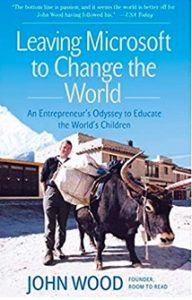 Leaving Microsoft to Change the World: An Entrepreneur’s Odyssey to Educate the World’s Children—by John Wood
Leaving Microsoft to Change the World: An Entrepreneur’s Odyssey to Educate the World’s Children—by John Wood
John Wood was with Microsoft in its startup years. He changed his trajectory when he left to start Room to Read with “the efficiency of General Electric and the compassion of Mother Teresa.” His story is a one of the most instructive startup books.
Room to Read seeks to transform the lives of millions of children in low-income communities by focusing on literacy and gender equality in education. John says of his nonprofit, “it has a Private Sector Brain, Nonprofit Heart.” Many years later, with over 30,000 schools and communities served, millions have been impacted by John’s decision to help a headmaster in Nepal fill his school’s library.
Published in February 2018, John’s latest book explores how a purpose-driven company can reap numerous business benefits including higher profits, employee motivation and customer attraction. An inspiring read for CEOs interested in bolstering their company’s mission filled with insightful interviews, case studies and compelling data.
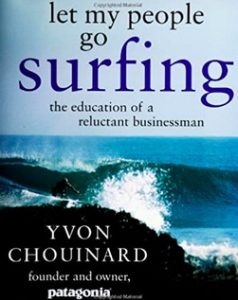 Let My People Go Surfing: The Education of a Reluctant Businessman—Including 10 More Years of Business Unusual—by Yves Chouinard
Let My People Go Surfing: The Education of a Reluctant Businessman—Including 10 More Years of Business Unusual—by Yves Chouinard
Let My People Go Surfing is the story of a man who brought doing good and having grand adventures into the heart of his business life—a book that will deeply affect entrepreneurs (and outdoor enthusiasts). His French father was a blacksmith, but as young adult he learned how to forge rock climbing pitons as a ‘bricoleur’, working on things that come to hand and making something new.
Eventually his first business came in 1965. Read the full story, it’s very inspiring. It grew through several stages to become the Patagonia of today, with revenues of more than $1 billion. Always dedicated to sustainability, Patagonia calls itself the Activist Company. And it is. I believe you’ll want to spend some time on the Patagonia website, for the lessons you can learn. He’ll share the first forty years of Patagonia with you in another book published in 2012, The Responsible Company.
In 2022 Chouinard gave the entire company to a uniquely structured trust and non-profit, designed to pump all of the company’s profits into saving the planet. He worked with his wife and two children as well as teams of company lawyers to create a structure that will allow Patagonia to continue to operate as a for-profit company whose proceeds will go to benefit environmental efforts.
You might even want to get Patagonia gear emblazoned with your logo!
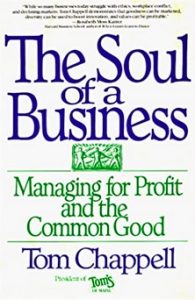 The Soul of a Business: Managing for Profit and the Common Good—by Tom Chapell
The Soul of a Business: Managing for Profit and the Common Good—by Tom Chapell
Published over 25 years ago, Tom’s book is one of those startup books that have enduring value. You may know one of his products, Tom’s of Maine toothpaste. Tom and his wife Kate founded the company in 1974 and eventually sold the company to Colgate in 2006, but they set up again in retail with Ramblers Way in 2009. He shows you how to re-shape a business to manage for the common good. A few years ago I met Tom and Kate in Maine and one of his remarks has stayed with me and is highly relevant today. He was commenting on how entrepreneurs are changing the world, and he wryly said to me, “the entrepreneur is today’s Senator of America.”
Even before my company did, Tom’s of Maine was giving away 10% of pre-tax profits and still does, even as a subsidiary of a major corporation. Likewise, it is a B Corp, like other purpose driven companies that have been acquired by multinationals, like Tom and Jerry’s. As of 2018, Danone of France has 9 certified B Corps, for more on this visit Lift Economy, whose mission is to create, model, and share an inclusive and locally self-reliant economy that works for the benefit of all life. Ramblers Way also gives 10% of profits to the community, as indeed did my main company, back in the 80s.
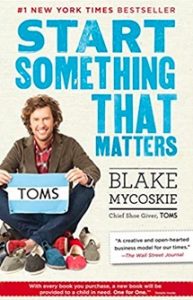 Start Something That Matters—by Blake Mycoskie
Start Something That Matters—by Blake Mycoskie
Blake is the Founder of Toms Shoes in 2006 and is known for one-for-one business model. Toms Shoes gives a pair to a kid with no shoes, for every purchase of one of their products, hence ‘buy-one-give-one’. By buying a book via Better World Books who give a book away for every one ordered. So does Madi Apparel founded by Haley Santell—in their case it’s women’s underwear. Founder Hayley learned underwear is the most under-donated clothing item & formed MADI in 2012 after learning a family member was once a victim of domestic violence. Underwear tops the most urgent needs list at most domestic violence shelters and sexual assault clinics.
The idea for a for-profit business with giving at its core came from a trip to Argentina in 2006, where Blake saw the hardships faced by children without shoes, from a lack of basic protection to the inability to attend school. Blake has extended the TOMS One for One model to address other vital needs, such as eye care and safe water, which was achieved through TOMS eyewear and coffee sales.
 Ice Cream Social: The Struggle for the Soul of Ben & Jerry’s—by Brad Edmondson
Ice Cream Social: The Struggle for the Soul of Ben & Jerry’s—by Brad Edmondson
This book was published in 2014, a long while after the purchase of Ben & Jerry’s by Unilever and thus gives a perspective on the development of the company’s economic and social missions after takeover by a multinational. He indicates that Paul Polman the Unilever CEO who retired in 2018 was indeed influenced by Ben & Jerry’s heritage. Paul says, “As CEO of Unilever, my personal mission was to galvanize our company to be an effective force for good. Unilever has an ambitious vision around decoupling growth from environmental footprint and at the same time increasing positive social impact through the Unilever Sustainable Living Plan”. Paul’s own book is Net Positive: How Courageous Companies Thrive by Giving More Than They Take.
Polman founded Imagine in 2019, to work with CEOs who are building their companies into beacons of sustainable business and leveraging their collective power to drive change on tipping points in their industry—from greenhouse gas emissions to labor standards to biodiversity. Polman is a big fan of the UN Sustainability Development Goals and describes them as a once-in-a-lifetime opportunity.
And then of course, there’s Ben & Jerry’s Double Dip: How to Run a Values-Led Business, and Make Money, Too—by Ben Cohen and Jerry Greenfield. Neither of the authors need an introduction. This book is their own story, published in 1998. To get the inside scoop it’s really important to read and understand the process by which the two established and developed both the brand and the social mission for which they became known and much respected. Ben & Jerry’s has always been committed to an ambitious three-part mission: making the world’s best ice cream, supporting progressive causes, and sharing the company’s success with all stakeholders: employees, suppliers, distributors, customers, cows, everybody.
As I revised this selection of startup books, I realized that it provided almost a course purpose driven entrepreneurship. It also told me that in the 2020s, we really do now have a different kind of approach to new venture creation and it gives me hope that it will become the norm.






